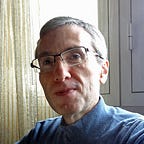Panspermia, Octopuses, and Comets 6/6
An eternal and uncreated Universe
Everything is possible if time is endless
So is this the definitive answer of panspermia’s advocates to the problem of the origin of life? A biological big bang made plausible by the HGD cosmological model? Not necessarily.
According to Wickramasinghe, even the smallest structures that regulate the chemistry of living beings are so complex that it is extremely unlikely that they were formed by abiogenesis. For example, he calculates that the probabilities that ribozymes, filaments of RNA capable of catalyzing chemical reactions such as enzymes, were formed by trial and error from a substrate of non-living matter are not more than 1 in 10¹⁸⁰. This means that it would take a sequence of at least 10¹⁰⁰ Big Bang of a Universe regulated by the very favorable HGD cosmology to allow such a tiny probability to be realized.
Ultimately, the birth of life from non-living matter is so absurdly improbable — Wickramasinghe believes — that only two viable hypotheses remain, to explain how that infinitesimal probability has occurred at least once (which must have happened, given that we are here at talk about it):
- we live in a Multiverse and, by pure chance, we happened to be born in one of those Universes…
